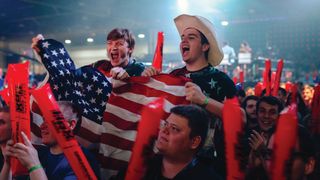Hi-Rez and Emory University team up to launch academic study of esports
The partnership aims to tackle basic assumptions about how esports scenes work.

Cultivate a successful esport—or so the theory goes—and reap the benefits elsewhere in your game. I’ve heard several variations on this idea over years of esports writing, where companies sometimes talk about pro gaming in similar terms to supermarket loss leaders—unprofitable in themselves but able to attract players who then spend money on the game. But a new partnership between Emory University and publisher Hi-Rez Studios aims to put that theory to the test.
“We’ve always believed that watching esports helps our game business,” says Todd Harris, Hi-Rez cofounder and president of its esports broadcasting subsidiary, Skillshot Media. “There was an appetite in the community to play, [and] publishers started to support that with prize money and structures and casting and production.”
He goes on: “Publishers did that because the thought was that by supporting esports from a business standpoint those fans will play the game longer, maybe they’ll even spend more money. So I think a lot of publishers have this intuition. But it’s not that someone’s come up with research that says, ‘Yep that actually can be quantified’.”
This is where Professor Mike Lewis’s team at Emory University comes in. Lewis is the director of the Marketing Analytics Center where his research ranges from traditional sports to politics. He has been aware of esports for a while and Harris is actually a guest speaker on his sports analytics course. “Over time, I think we just discovered a mutual interest in understanding fandom,” says Lewis. “Hi-Rez has the data and Emory can supply some academic horsepower.”

His initial hypothesis is that esports will increase engagement (measured in terms of playing, winning and making purchases) “because it provides a focal community or a place for interaction”. Testing this claim involves trying to isolate how behaviour changes when players watch esports. “What we do is try and construct samples of watchers and non-watchers that have very similar levels of activity prior to exposure to esports programming.”
Respecting privacy
In case you’re (entirely reasonably) wondering about the sensitivity and granularity of player data involved, Harris tells me that it’s already anonymous when they pass it to Emory: “The data is anonymised to not even include attributes like gender and age and other things.” Lewis adds, “We are very respectful of player privacy. We never look at any individual level identifying information beyond country of origin.”
How (or if) esports affects engagement with the underlying videogame is only one of approximately a bajillion questions which could make use of Lewis and his team’s expertise. As if to illustrate that, there’s a second initial project, this one investigating consumer behaviour in the industry, so how systems like rewards, levelling up and gaining community status affect purchasing behaviour. I wonder if I should volunteer my quest for a dinosaur-themed cosmetic in Dota 2 as a case study?
The biggest gaming news, reviews and hardware deals
Keep up to date with the most important stories and the best deals, as picked by the PC Gamer team.
A better understanding of how an esport relates to the game it’s based around obviously has the potential to impact business decisions of companies like Hi-Rez. For Harris, the research is of interest for two reasons. One is Hi-Rez’s own stake in esports as part of its business. The other is that, via Skillshot, they are hoping to provide a service to other publishers with esports scenes.

A white paper outlining the partnership’s first findings is expected in the first quarter of 2019. Harris tends to speak with the expectation that the research will bear out the idea that esports is good for a game. But there’s always the chance research can throw up unexpected conclusions. What happens if the results run counter to publishers’ esports intuitions?
Harris points out that Hi-Rez only makes competitive games and its staff members are big fans of esports so there’s a personal investment as well as a business one. “So really, regardless of what the research comes back with we don’t see ourselves decreasing our investment.” Outside esports-savvy communities there’s a tendency to refer to esports as if it’s a monolithic entity rather than a diverse set of communities, game genres, commercial structures and teams. I ask Lewis how he is treating the idea of esports and how it’s broken down into areas.
Examining esports
“This is an interestingly phrased question,” he says. “One of my challenges in this partnership has been trying to get my head around the big picture of esports. In traditional sports, a lot of fandom behaviours can be tracked back to how leagues organise themselves. I do a lecture in class talking about levels of control—you have sports ranging from the NFL with hard salary caps, revenue sharing, amateur drafts to the wild west of professional boxing. The key point is that the way a sports category works (and how consumers behave) can usually be understood based on how the league is organised.”
The variety in the esports sector and the data available mean Lewis is choosing to focus the team’s research on trying to understand individual behaviour at a fundamental level. This means starting from first principles in terms of consumer psychology and taking loose hypotheses to the data. “But, I will always be very up front in terms of what I don’t know,” he adds. “To me [it still looks] like a vast and expanding landscape. It’s one of the things that makes this an exciting partnership.”
Professor Mike Lewis has published some information on the case study, and you can find out more on his Emory blog.
Most Popular

